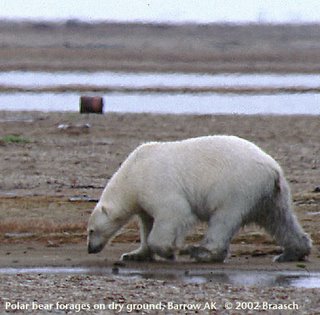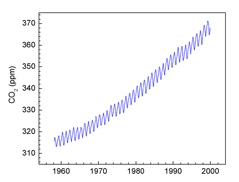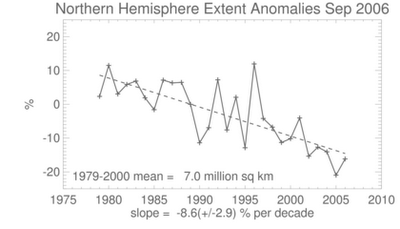A world view of global warming
 Gary Braasch of World View of Global Warming was nice enough to let me reproduce this picture of a Polar Bear foraging on dry ground in Barrow, Alaska. His website is a photographic essay of how global warming is affecting people, plants and animals all over the world.
Gary Braasch of World View of Global Warming was nice enough to let me reproduce this picture of a Polar Bear foraging on dry ground in Barrow, Alaska. His website is a photographic essay of how global warming is affecting people, plants and animals all over the world.Personally, to date, global warming has affected my view of the detractors more than it has affected my day to day life. I have realised that media and politicians generally have little understanding about how science works, its interface with advocacy and how scientific information is best used in the face of uncertainty. Take the following statements:
Global warming will cause the extinction of 90% of life on Earth.
Global warming is caused primarily by human activity.
The truth or otherwise of these statements is not currently known with absolute certainty.
Is this uncertainty a reason for inaction? No! Based on current scientific evidence, there is a possibility that the human activities driving climate change could precipitate a mass extinction event — the first in 65 million years. Should we take that chance? Over time the scientific evidence will grow until we are near certain, one way or the other - either climate change will be devastating or it won’t. But can we wait until near certainty is established before we act? No! The precautionary principle says that if the consequences of an action (for example, converting all the world’s fossil fuels into greenhouse gases and deforesting the planet) are unknown, but are judged to have some potential for major or irreversible negative consequences (like making the planet uninhabitable for humans and many other species), then it is better to avoid that action. So why are we currently conducting an uncontrolled experiment on the only habitable planet we know of?
Invoking the precautionary principle is the only reasonable action that politicians can take in this situation. The quality of the debate in the media around this issue has been woeful. Especially the so-called ‘balanced’ reporting, where Kyoto Protocol detractors are given as much airtime as are advocates for action against global warming. This ‘balanced’ reporting is usually delivered without even mentioning the dwindling number of detractors and their tendency to be associated with the oil industry.
Apart from the wealth of information from long term studies of atmospheric levels of greenhouse gases, ice cores and so forth, the record heat in summers in Europe, forest fires for months in Portugal, the worst Atlantic hurricane season ever recorded, and a rapidly disappearing Arctic ice cap are all (quite probably) signs of the long-term effects of climate change. The Tegua islanders of Vanuatu have had to shift their entire town recently due to frequent flooding and are probably the world’s first climate change ‘refugees’. How much more evidence is required before Dubya and his cronies join the rest of the world and acts on this problem now, before it is too late. Some things are actually more important than the Gross Domestic Product.



1 Comments:
At 10:00 AM, dc_red said…
dc_red said…
"So why are we currently conducting an uncontrolled experiment on the only habitable planet we know of?"
Sadly, because it is expedient in the short term.
Post a Comment
<< Home